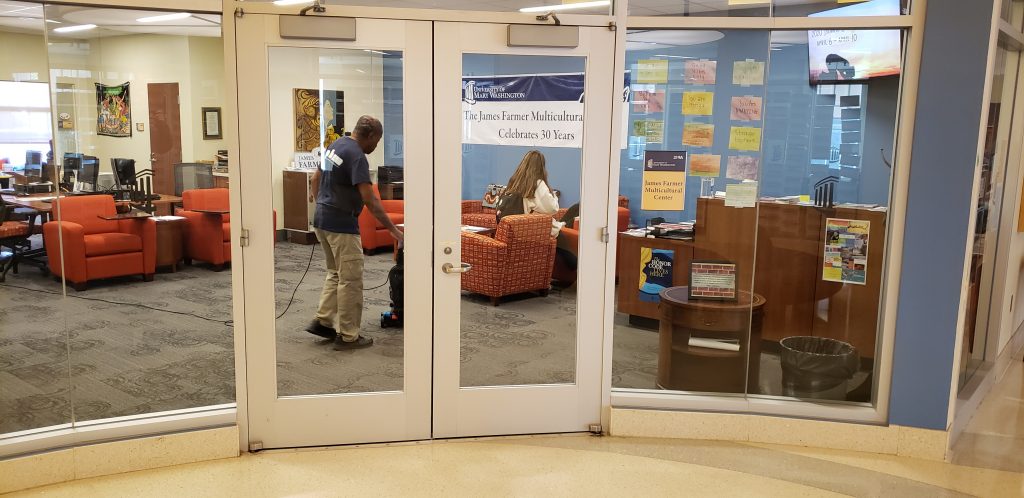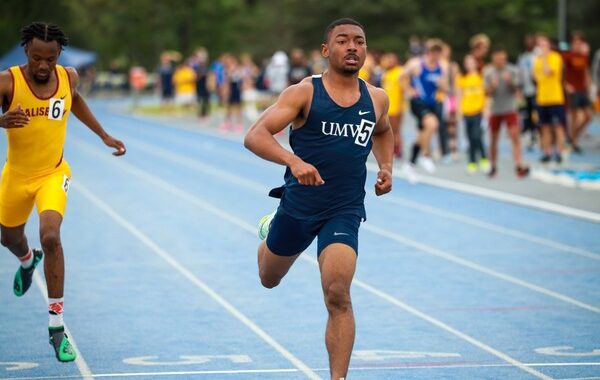James Farmer Multicultural Center celebrates 30th anniversary
3 min read
The JFMC celebrates 30 years of promoting inclusivity on the UMW campus. (John Wray / Blue & Gray Press)
by ABIGAIL WEBER
Staff Writer
On Tuesday, students eating dinner at the top of the University Center had an unusual treat: rainbow cake and rainbow sherbet. The colorful desserts were served as part of Blasting Off to a Rainbow Planet, this year’s LGBTQ+ pride week celebration hosted by People for the Rights of Individuals of Sexual Minorities (PRISM) and the James Farmer Multicultural Center.
The James Farmer Multicultural Center is celebrating 30 years of being a force for change on the Mary Washington campus and beyond. But the rainbow desserts show a larger shift in how UMW and the Multicultural Center have evolved and grown in its influence and the number of people and clubs it celebrates and defends.
1990 was a year that saw significant social change for the United States. David Dinkins became New York City’s first African American mayor in January, the first Asian Pacific American Heritage Month was held in May, and the Americans with Disabilities Act steadily made its way through Congress before becoming law in July. 1990 was also the year that Mary Washington College president William Anderson established what would become the James Farmer Multicultural Center.
Even as this social and legal change swept the nation, Mary Washington College remained over 90 percent white. In an article about a new program addressing racial and sexual (referring to cisgender women, not sexuality or gender identity) discrimination in the Sept. 19, 1989 edition of the MWC Bullet, Jamie Sutphin reported that people of color made up only 6.5 percent of the student body. Today, according to the 2018-2019 Institutional Research Common Data Set, people of color make up over 30 percent of the student body.
With few students of color to organize in the early days, the Multicultural Center nevertheless worked to increase tolerance, awareness and cultural understanding by working with a handful of organizations. By 1993, Armand Marquardt reported that only seven “ethnically oriented” clubs stood on the UMW campus serving the students of color who made up 10 percent of the student body. These included Women of Color, Black Men of New Direction (BOND), the Asian Student Association, and the Black Student Association, all of which are still active.
Today, there are 27 multicultural clubs on campus, according to UMW’s Presence club listing. The Multicultural Center works with student organizations on the Multicultural Leadership Council like PRISM, the Latino Student Association and the Muslim Student Association to co-sponsor events.
“[The service from the center that has helped the school the most is] probably incubating and bringing student led organizations to the front and letting them run their own things and be kind of grassroots while also having professional backing,” said freshman Multicultural Center employee Jesse Frye.
James Farmer and his namesake Multicultural Center are featured prominently and memorably in advertising for the University, including tours.
“I knew when I came on my first tour I wanted to work here,” Frye said. “I’m one of the lucky ones who got hired.”
This, too, is a change. In an editorial for the Bullet in 1998, the editorial board chastised the college for failing to advertise and elevate his achievements and presence at the school. This editorial claims that the renaming of the Multicultural Center was the result of a student-led effort.
As for James Farmer himself, the civil rights leader and professor described his stance on multiculturalism in a 1997 Bullet article on Black History Month celebrations.
“American citizens need to become more aware of their other American citizens,” Farmer said. “It serves the whole nation’s culture well to understand all the cultures that go into making the national fabric. To understand the threads of culture that makes up our nation makes us appreciative of diversity.
Though Farmer died in 1999, his legacy lives on through the Multicultural Center. UMW will celebrate Farmer’s 100th birthday in January.











